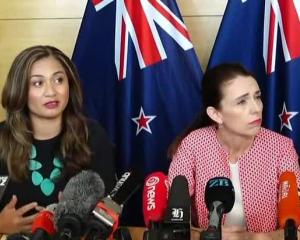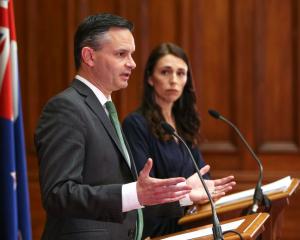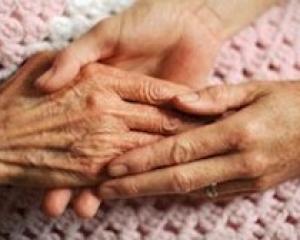Grant Robertson has had a few moments in his career when he has wondered: "How has a boy from South Dunedin ended up here?"
Mr Robertson added another one to the list yesterday, when Prime Minister Jacinda Ardern named him as deputy prime minister.

"You don’t forget your roots, as Six60 might say."
Mr Robertson has been Finance Minister for the past three years. He retains that portfolio and also assumes responsibility for infrastructure.
That places Mr Robertson, who was central to the emergency response to Covid-19, at the forefront of the economic recovery from the effects of the pandemic.
"It’s about being a backstop for her [Ms Ardern] and filling in for her occasionally, but she was also very clear with me to ensure we deliver on the commitments we have made and do the things we said we would as part of our overall Covid response and rebuild."
The health and economic impact of Covid-19 was continuing worldwide and made forward planning an uncertain science, Mr Robertson said.
With major European economies entering lockdown again, New Zealand’s economy would no doubt suffer another buffeting, he said.
"We need to see New Zealand through this, and I think the plan we put out during the election was a good, balanced one, making sure we are aware of Covid-19 but also building back better.
"We have got a massive infrastructure programme under way with more to come, and my job is making sure that we are building on the foundations laid in the last term."
Mr Robertson’s ascension to the deputy prime ministerial role was enabled by Labour’s deputy leader, Kelvin Davis, ruling himself out for the post.
Mr Davis said yesterday he had told Ms Ardern before the election that while he wanted to remain deputy leader of the party, that role was the limit of his ambitions.
Ms Ardern said yesterday she had asked Mr Davis to reconsider, but he stuck to his decision.
"Grant has been given the seniority and portfolio mix required to drive our economic recovery," she said.
"I am excited by the opportunities we have here.
"It will be hard, but the legacy that we can leave the next generation in the way we choose to rebuild, is immense."
Mr Robertson’s mother, Yvonne Wilkie, of Brockville, laughed when she answered the phone yesterday afternoon.
She said she was "very proud" of her son but declined to be interviewed.
Ms Ardern managed to spring several surprises in a far-reaching reshuffle of her team.
Nanaia Mahuta was a name few thought was in the running for Foreign Affairs and Andrew Little was an unexpected choice for Health.
Senior MP Phil Twyford retains a ministerial rank but plummets out of Cabinet, as does Jenny Salesa, who will be nominated to be Assistant Speaker.
Newly-elected list MP Ayesha Verrall, a one-time president of the Otago University Students Association and a specialist in infectious diseases, soars straight into Cabinet.
"It is not without precedent to bring new members straight into Cabinet," Ms Ardern said.
"In the middle of a global pandemic, I believe we would be foolish not to use the considerable expertise Dr Verrall brings in infectious diseases into our response."
Chris Hipkins retains education, but takes on a new portfolio of Covid-19 response, building on the work he has done recently as temporary Health Minister.
Former Otago MP David Parker remains Attorney-general, and Dunedin MP David Clark returns to Cabinet.
Te Tai Tonga MP Rino Tirikatene becomes an under-secretary, helping Mr Parker in a new portfolio of Oceans and Fisheries and also promoting Maori trade in the Trade portfolio.
Comments
A good, well meaning, calm and considered man. Dunedin is and should be very proud to have such a humble and dedicated person, one of their own, serving New Zealand at the top levels, so well, in such troubled and extraordinary times.
Hat off to you and your family Grant.













